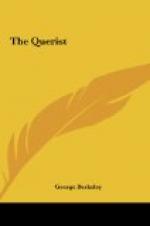305. Qu. Whether a Sum, which would go but a little way towards erecting hospitals for maintaining and educating the children of the native Irish, might not go far in binding them out apprentices to Protestant masters, for husbandry, useful trades, and the service of families?
306. Qu. Whether if the parents are overlooked, there can be any great hopes of success in converting the children?
307. Qu. Whether there be any instance, of a people’s being converted in a Christian sense, otherwise than by preaching to them and instructing them in their own language?
308. Qu. Whether catechists in the Irish tongue may not easily be procured and subsisted? And whether this would not be the most practicable means for converting the natives?
309. Qu. Whether it be not of great advantage to the Church of Rome, that she hath clergy suited to all ranks of men, in gradual subordination from cardinals down to mendicants?
310. Qu. Whether her numerous poor clergy are not very useful in missions, and of much influence with the people?
311. Qu. Whether, in defect of able missionaries, persons conversant in low life, and speaking the Irish tongue, if well instructed in the first principles of religion, and in the popish controversy, though for the rest on a level with the parish clerks, or the school-masters of charity-schools, may not be fit to mix with and bring over our poor illiterate natives to the Established Church? Whether it is not to be wished that some parts of our liturgy and homilies were publicly read in the Irish language? And whether, in these views, it may not be right to breed up some of the better sort of children in the charity-schools, and qualify them for missionaries, catechists, and readers?
312. Qu. Whether there be any nation of men governed by reason? And yet, if there was not, whether this would be a good argument against the use of reason in pubic affairs?
313. Qu. Whether, as others have supposed an Atlantis or Utopia, we also may not suppose an Hyperborean island inhabited by reasonable creatures?
314. Qu. Whether an indifferent person, who looks into all hands, may not be a better judge of the game than a party who sees only his own?
315. Qu. Whether one, whose end is to make his countrymen think, may not gain his end, even though they should not think as he doth?
316. Qu. Whether he, who only asks, asserts? and whether any man can fairly confute the querist?
317. Qu. Whether the interest of a part will not always be preferred to that of the whole?
FINIS
ERRATA.
Page 10. Line 17. for inexhaustable r. inexhaustible P. 14 L. 22. for Helpless r. Hopeless. P. 16 L. ult for than r. as.
Part II
Query 1.




